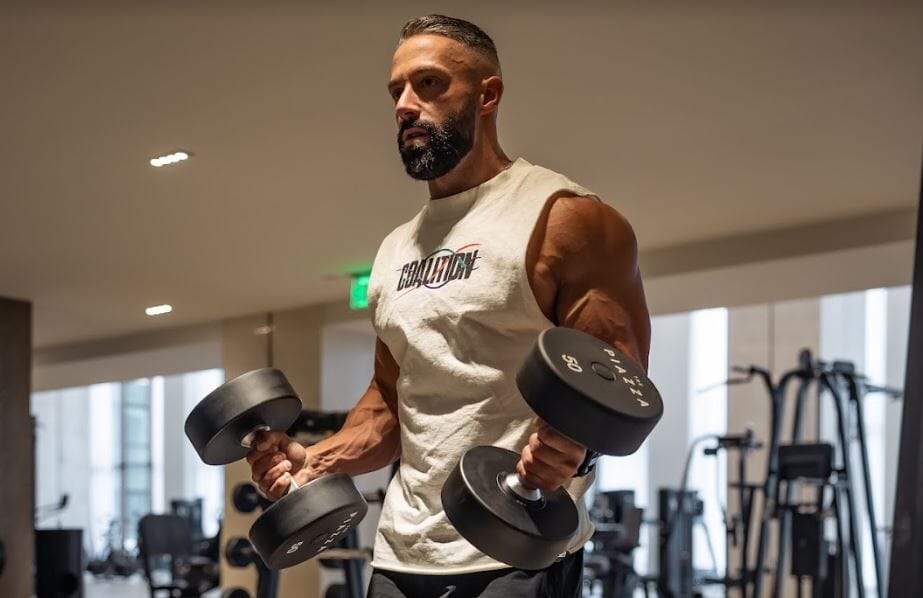One of the most common mistakes people make when it comes to fitness is not hydrating properly. Let’s face it, you sweat when you exercise and if you’re not replacing the fluids lost, you’re quickly going to become dehydrated. Dehydration can have a negative impact on both physical and mental health, which is going to seriously impact your gains. That’s why a lot of sports nutrition supplements, from pre-workout to energy drinks, contain a natural compound called glycerol.
What is glycerol?
Glycerol, also known as glycerin or glycerine, is an organic amino acid that is produced during metabolism from glucose, proteins, pyruvate, triacylglycerols, and other glycerolipid metabolic pathways [1]. It’s a 3-carbon molecule that’s referred to as the “backbone” of several important fatty acid and molecule compounds. Three fatty acids bond to a glycerol molecule. Glycerol's chemical structure classifies it as an alcohol, or more specifically, a sugar alcohol. Although naturally occurring, athletes have supplemented synthetic glycerol in their diet for numerous benefits including hydration, energy, and more.
How to use glycerin for hydration?
Dehydration alters cardiovascular and thermoregulatory function in athletes which can hinder their endurance exercise capacity [2]. The effects of not properly hydrating can be severe and include:
- Confusion
- Dizziness
- Fatigue
- Headaches
- Heat injury
- Kidney issues
- Low blood volume shock
- Seizures [3]
One of the greatest uses for glycerol in exercise and sports is its ability when taken orally to act as an osmotic gradient favoring fluid retention. This means your kidneys will absorb more water as it passes through them which results in reduced urinary output. These effects ca,n last up to four hours which is perfect for a workout window. Studies have shown that drinking a beverage containing glycerol can increase body water percentages by one liter or more. Many athletes use a combination of glycerol and salt to achieve peak hydration levels, also known as hyperhydration. Staying hydrated means you’ll feel and perform at your absolute best.
Does glycerol give you pumps?
Another awesome thing about glycerol is it promotes increased blood flow when taken prior to exercise. It improves the movement of water through the vascular system, making for bigger and better pumps. But what makes glycerol such a great pump inducer, is its ability to work alongside other pump ingredients. Its unique way of drawing water means that when it pairs with pump inducers that work through nitric oxide (NO) production, you truly get the best of both worlds.
Glycerol monostearate is typically added into products such as HydroMax or GlycerPump with 5g serving sizes at a 65% yield. That means your body will only actually absorb 3.25g of the glycerol monostearate. Coalition Nutrition offers a liquid product called Nutristat Pump Script, which does the unthinkable, offering 23g of active glycerol at 100% yield.
Effects on muscle growth, endurance, and recovery
In direct correlation with muscle pumps is muscular growth. The bigger the pumps the more potential for muscle growth there is. With glycerol, the hyper-hydrated muscles are working at a high magnitude. Not only are you going to see better pumps by taking glycerol, but your overall performance levels are going to improve as well.
Studies have shown that glycerol ingestion actually increases “exercise tolerance” by about 24% [4]. As we talked about above, glycerol makes it easier to stay hydrated during your workout, so you’ll almost certainly see an increase in your endurance. Maintaining the proper body water percentage can also help delay fatigue and avoid heat stress in high-temperature environments.
Glycerol’s facilitation of hyperhydration is going to promote better recovery, too. Water carries nutrients to the recovering muscles. The more hydrated you are, the more nutrients will be carried to the cells, resulting in a shorter recovery time.
How much glycerol do bodybuilders need?
According to the FDA, the use of glycerol for multiple purposes, including dietary supplementation, has been deemed safe in accordance with good manufacturing practices [5]. The amount of glycerol you want to take is going to depend on factors like your weight, the type of exercise, and your goals.
Average dosages range somewhere from 1 to 1.2 grams of glycerol per kilogram of body weight. Bodybuilders looking for those massive pumps will probably stick to the higher dosage. However, you always want to start at the lower end of the spectrum to gauge your body’s initial reaction to adding glycerol before increasing the amount.
References:
- Patlar, Suleyman, et al. “The Effect of Glycerol Supplements on Aerobic and Anaerobic Performance of Athletes and Sedentary Subjects.” Journal of Human Kinetics, U.S. National Library of Medicine, Oct. 2012, https://www.ncbi.nlm.nih.gov/pmc/articles/PMC3590833/.
- van Rosendal SP; Osborne MA; Fassett RG; Coombes JS; “Guidelines for Glycerol Use in Hyperhydration and Rehydration Associated with Exercise.” Sports Medicine (Auckland, N.Z.), U.S. National Library of Medicine, https://pubmed.ncbi.nlm.nih.gov/20092365/#:~:text=Glycerol%2Dcontaining%20beverages%20create%20an,are%20achievable%20through%20glycerol%20hyperhydration.
- “Dehydration.” Mayo Clinic, Mayo Foundation for Medical Education and Research, 14 Oct. 2021, https://www.mayoclinic.org/diseases-conditions/dehydration/symptoms-causes/syc-20354086.
- Riedesel ML, Allen DY, Peake GT, Al-Qattan K. Hyperhydration with glycerol solutions. J Appl Physiol. 1987;63:2262-2268

